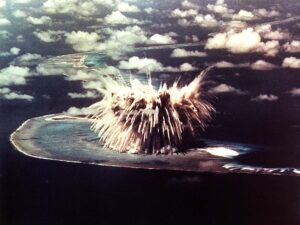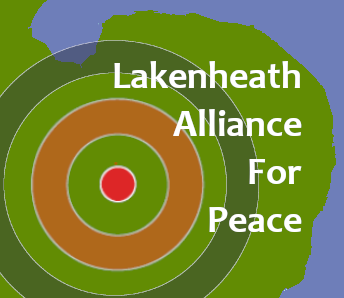
“Nuclear weapons do harm every day. From the mining of uranium to the creation of the bomb and the everlasting radioactive waste, our planet carries the scars of so many nuclear sacrifice zones. Nuclear colonialism has disproportionately impacted Indigenous Peoples and marginalised communities. Indigenous Peoples lands were taken. Bodies were used, people were bombed.”
Affected Communities Statement UN General Debate 2023 ICAN report
Systemic inequities, and often direct targeting, cause indigenous peoples and communities of colour to be more severely impacted by nuclear weapons. In the context of the US, the locations used for uranium mines, nuclear weapons production facilities, nuclear weapons test sites, and nuclear waste storage sites are largely on Native American lands, or otherwise sited near predominately lower income communities and communities of colour. Nuclear weapons were also tested on islands throughout the Pacific Ocean, including the Marshall Islands and others, with devastating health impacts. These are examples of “nuclear colonialism,” and this same pattern holds true for all nuclear powers globally, from the colonialism inflicted on aboriginal Australia and North and South America to central Africa and beyond.
It comes as no surprise that people of colour and women oppose nuclear weapons in proportionally far greater numbers than do white men. Though predominately male-led, white countries produce them, the impacts throughout the life of these weapons almost always affect indigenous peoples first, and worst.
The Unequal Impacts of Nuclear Weapons by Oregon Physicians for Social Responsibility
Since the dawn of the atomic age, in July 1945, nuclear tests have been carried out in the atmosphere, underwater and underground at more than 60 locations around the globe, often on the lands of indigenous and minority peoples – far away from those who made the decisions to conduct them.
There are numerous examples of the impact of nuclear detonations on Indigenous peoples in Pacific Island states, Marshall Islands, Aboriginal lands, in the US, Algeria within Russia, within China.
“We continue to experience epidemics of cancers, chronic diseases and congenital abnormalities as a result of the radioactive fallout that blanketed our homes and the vast Pacific Ocean on which we depend for our livelihoods. Entire atolls remain unsafe for habitation, for agricultural production, and for fishing. Some islanders have been permanently displaced from their homes and disconnected from their indigenous way of life. They have suffered, and continue to suffer, untold anguish, heartache, and pain.”
ICAN Prohibiting Nuclear Weapons Pacific Report
